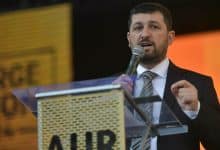
There is a shadowy, unofficial, yet highly influential structure in Europe that systematically works to weaken and subdue nations, ultimately seeking to dissolve them into an artificial construct known as the “European superstate.” This establishment is not democratically elected, does not answer to the people, and is accountable to no legitimate institution. It operates in the shadows, using state apparatuses, judicial systems, and transnational influence networks to achieve its goals. All of this is done under the pretense of European integration, but in reality, it serves a dangerous ideological agenda—one that stands in stark opposition to the foundational principles of the European Union.
The EU was born as a project of peace and cooperation among nations. But what we see today is a hijacking of that vision: a bureaucratic elite, detached from reality, trying to reshape Europe into a single, centralized state—stripped of national identity, sovereignty, and above all, opposition. This elite understands that in order to succeed, they must crush all patriotic forces and silence any leader who dares speak of freedom, nationhood, and tradition. Within this context, the cancellation of Romania’s presidential elections in December 2024 is no accident. It is a calculated move in a broader agenda—an attack on Romanian democracy aimed at preventing a patriotic force from reaching power.
This informal network, this European establishment, shamelessly uses EU funds—resources meant for the development of member states—to finance obedient NGOs, manipulation campaigns, media influence operations, and ideological re-education projects. Instead of supporting farmers, local businesses, or infrastructure, these funds are redirected toward initiatives aimed at radically reshaping society: gender ideology, dismantling Christian values, and demonizing national identity. This constitutes a misuse of public resources for illicit purposes, outside the legal framework and contrary to European treaties. And because these structures are neither transparent nor accountable, they exhibit characteristics of criminality. They are networks of power operating above the law.
The tools of control are well known: justice is weaponized, intelligence services are repurposed into instruments of political intimidation, and state institutions are captured and repurposed to serve this foreign agenda. The voice of the people is drowned out by propaganda, and patriotic leaders are demonized, investigated, or eliminated through administrative and legal maneuvers. The political battle in Romania is no longer just an electoral contest—it is a global struggle between two worlds: one dark and globalist, disguised in the language of “rights” and “diversity” but enforcing a destructive vision by force; the other bright and patriotic, rooted in culture, faith, and the sovereign will of each nation.
Romania is the battlefield today. The presidential race is not merely local—it is symbolic for all of Europe. On one side stand citizens who want a free, dignified country, anchored in its historical values. On the other side is a system that seeks to turn Europe into a shapeless, controllable mass, without roots or voice. They speak of the rule of law—but what kind of rule of law cancels elections arbitrarily? They speak of freedoms—but what kind of freedom silences all dissent not aligned with political correctness?
Europe must return to its roots: a Europe of nations, of cultures, of genuine diversity—not one imposed through directives and sanctions. The Union must not become a prison for its peoples but a space of respectful cooperation. The suprastate project is a failure. It breeds division, resentment, and, sooner or later, will bring about the collapse of the European structure. Romanians, in December 2024, had a chance to stand up and show they cannot be controlled. That’s why they were stopped. That’s why the fight continues.
But one day, light will overcome darkness. The will of the people cannot be suppressed forever. And history does not forgive betrayal.

